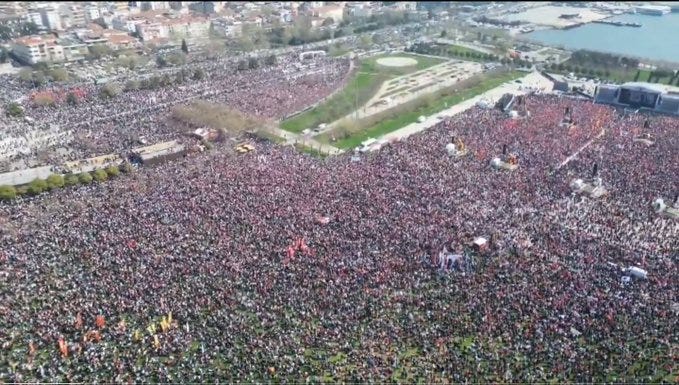Turkey's protests
Why Erdogan will survive this, too, and what happens if he does not.
Commercial Audience: Currency traders, property insurers, supply chain managers, macro traders.
Editor’s note on how we write: The first section is for analysts. This is where we provide our reasoning (sometimes partly paywalled). The second, shorter, section is for commercial clients (paywalled). This is where we give commercial implications. We mention the commercial sectors affected so you can know if this is of interest.
President Erodgan triggered another wave of unrest after security forces arrested Ekrem Imamoglu. The latter is the two-time mayor of Istanbul, and is a leader of the Republican People’s Party (CHP, founded by Mustafa Kemal Ataturk, the founder of the Turkish republic and architect of the now practically defunct Turkish secularism). The arrests anticipated the CHP’s plan to declare Imamoglu as their 2028 presidential candidate, which the CHP went ahead with anyway. Another CHP mayor is now the acting mayor of Istanbul.
The Istanbul Chief Prosecutor accused Imamoglu of terrorism, by supporting the Kurdish Marxist separatist PKK Party, and of corruption, including by rigging bids and money laundering. A court quickly dropped the terrorism charges. Imamoglu remains detained until his trial on the other charges.
The opposition has called for weekly protests - it had briefly called for daily protests, but abandoned these. This weekend brought out to 2.2 million people, according to organisers. We warn, however, that these numbers are most likely grossly exaggerated, and that 300,000-500,000 is more realistic. Still, this is indicative of public opposition to Erdogan.
Why now?
If the election is in 2028, why arrest Imamoglu now?
There are three possible answers:
To cut off his campaign before it starts. This is the most obvious answer. Instead, Erdogan may have helped fire up Imamoglu’s campaign.
To prepare for early elections. There is speculation that Erdogan is suffering from cancer and that he will have to organise early elections to pass the torch to a trusted successor. Someone like Foreign Minister and former head of MIT (Turkish intelligence) Hakkan Fidan, who is likely to protect Erdogan’s family and continue his policies.
To keep the opposition off balance. Erdogan has been a master at keeping his rivals distracted and disoriented. Picking a fight with them now, while giving himself enough time to reach agreements with some of his opponents before the next election, may help him keep the opposition divided.
Erdogan’s position
We note that Erdogan controls the judiciary, the interior ministry, the defence ministry, the military, the intelligence agencies, the police, the electoral commission, the central bank, and the media. Local media has imposed a total blackout on the demonstrations. With social media, it is possible to bypass this blackout, but the government can equally restrict access to X, Facebook, and other platforms, in a bid to weaken its opponents. Erdogan can weather sustained protests, though the policy of ignoring unrest suggests that his media machine has no clear response to the protesters.
Furthermore, the Turkish opposition remains inchoate and incoherent. They have repeatedly failed to come to an understanding about policy. They have regularly abandoned large coalitions to make side deals with Erdogan. This is unlikely to change.
Historical context
We note that, for example, the Lebanese cabinet was able to remain in place in the face of Hezbollah from November 2006 to May 2008. Even then, the deadlock was broken when Hezbollah used armed force, not because of civil unrest. Similarly, the Ukrainian protesters in 2014 resorted to force to topple the sitting president.
By contrast, the Egyptian 2011 protests succeeded not due to the unrest itself, but because the Army, due to American pressure and to avoid having Mubarak’s son succeed him, issued Statement Number 1, universally understood in the Arab world - and by Mubarak - as the start of a coup. The protests in Syria, Yemen, and Libya resulted in civil war, then regime overthrow. As for Tunisia, it lived to regret its brief democratic experiment, which resulted in an incoherent, disunited government that struggled to implement policy.
For unrest to succeed, it requires a combination of at least some of the following: foreign backing by a superpower, violence against state authorities, a loss of will by the leadership or by police officers on the ground, and/or substantial divisions within the elite. None of these are apparent in Turkey. Despite the high inflation that Turkey has experienced, Erdogan can still claim to have revitalised the country’s industries, spent on social welfare for the poorest, raised rural Turkey from extreme poverty, and given his country a major geopolitical role. He still has a significant support base in the country, including among the business elite and in rural areas. Practically everywhere, large cities are more liberal and secular, as is the case in Turkey.
The Turkish lira
On the currency, we note the following:
The currency collapsed rapidly on the news of Imamoglu’s arrest, and then recovered some of its losses.
If it was inflation alone that would lead to Erdogan’s overthrow, it would have happened already, and could happen at any time. Having seen Venezuela, Argentina,
Inflation was a perennial problem in Turkey - the period from 2001-2015 was the historic exception.
As such, while the lira has lost 100% of its value in the last decade, we do not view this as sufficient.
Commercial Implications
Erdogan will most likely not be overthrown. He is here to stay. His priority will be to pass the baton to someone who continues his legacy.
If we are wrong, and Erdogan is overthrown, the consequences will likely include the following:



